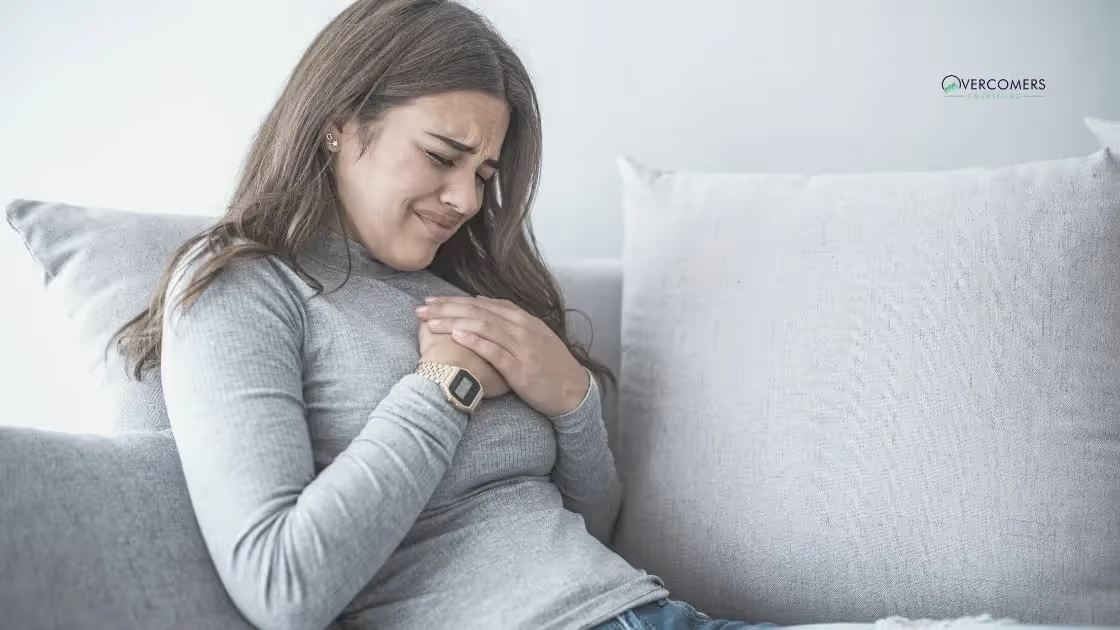Do you have anxiety-associated pain and wonder, can anxiety attack cause chest pain?Yes, anxiety attacks cause chest pain which is similar to a heart...

Do you have anxiety-associated pain and wonder, can anxiety attack cause chest pain?
Yes, anxiety attacks cause chest pain which is similar to a heart attack.
If you've ever experienced a panic attack, you know that it can feel like you have a heart attack—which is why anxiety attacks are often mistaken for them.
In both cases, the physical symptoms can include chest discomfort, shortness of breath, palpitations (abnormal awareness of your heartbeat), and dizziness.
Fortunately, there are some ways to distinguish between the two.
To know whether you are experiencing a heart attack or an anxiety attack, you will have to monitor the symptoms closely.
An anxiety attack can cause your heart rate to rise and make you sweat.
We need to understand what causes anxiety attacks to take measures to avoid them in the future.
An anxiety attack can cause chest pain! It's a common symptom of anxiety, and it can be frightening.
Heart disease is the number one killer of both men and women in the United States.
So, if you are having chest pain and you've never had it before, it's completely normal to worry that you might be having a heart attack.
Most of the time, it's not a heart attack.
But you should still see a doctor to make sure.
It may turn out to be something as simple as a pulled muscle or as serious as a blood clot in your lungs (pulmonary embolism).
You could also have acid reflux (heartburn), an ulcer, gallbladder disease, or an inflammation of the esophagus (esophagitis).
Or perhaps your chest pain is from gas bubbles in your digestive tract.
If your chest pain is from anxiety, it probably won't kill you…unless you have an undiagnosed heart condition that is worsened by stress.
Some people experience significant physical symptoms when they are anxious.
Some people have these symptoms with no apparent cause.
Others find that their physical symptoms follow a stressful event or major life change.
Whatever the reason for the symptoms, the physical reactions are real and you need to deal with them.
Chest pain, or chest discomfort, is a common complaint and can be caused by many things.
Some tests can help determine the cause and it's important to see your doctor to get a correct diagnosis.
If it's from anxiety though, I'll tell you what causes chest pain with anxiety and how to deal with it.
The triggers of anxiety attacks could be a particular event or situation.
The causes are not completely understood.
But a common belief is that it results from a combination of factors, including genetics and environment.
These factors include:
The anxiety attack episode can lead to chest pain, among other symptoms:
While anxiety attacks can cause chest pain, it's not to be confused with a panic attack.
Panic attacks are a whole other kind of beast; they often feel like you're having a heart attack, but they are not.
Chest pain during an anxiety attack is typically harmless. Chest pain isn't always a sign of a heart attack.
If you are having chest pain during an anxiety attack, it is most likely harmless.
There are other things to be aware of, however.
If your chest pain is accompanied by fainting, an abnormal heartbeat, or difficulty breathing, you should see a doctor immediately.
Another important thing to keep in mind is that chest pain is one of the key symptoms of a heart attack.
If you are experiencing chest pain and have not been diagnosed with anxiety disorder, then there is a chance that your symptoms could be caused by something else.
Anxiety attack chest pain may be the result of a muscle strain or the way that the body responds to stress.
Anxiety can cause chest pain, though it may seem counterintuitive.
The reason for this is that anxiety can affect the heart, lungs, and other major organs in the body.
It may be the result of a muscle strain or the way that the body responds to stress.
For example, it may cause your heart rate to increase or you to breathe faster.
These changes in your breathing and heartbeat can make your chest hurt.
However, if chest pain is a symptom of an underlying condition, it may need immediate treatment.
Some common causes of chest pain include:
Chest pain from anxiety is similar in some ways to heart attack symptoms.

Many people ask whether or not they should be concerned.
More often than not, chest pain from an anxiety attack is nothing to have a serious concern about.
It is a symptom of an anxiety attack.
The first step toward relieving chest pain associated with anxiety attacks is to get medical attention.
If you are experiencing severe chest pain, severe shortness of breath, fainting, or dizziness while walking upstairs or with head movement, stop what you're doing and contact 911 immediately.
You may also want to consider going to the hospital for immediate evaluation and treatment.
As for your situation, if your symptoms are minor and you feel like you can handle them on your own, there are a few things you can do to further reduce the intensity of the symptoms.
First off, try acclimating yourself to whatever environment causes the most anxiety to break the cycle of panic attacks.
Light diffuse light sources will help a lot with this process because they don't tend to affect your ability to see as much as flickering lights or direct sunlight can.
Try moving around as much as possible.
It's also worth trying meditation techniques that focus on breathing techniques (as opposed to just concentrating on not having panic attacks).
Be sure that you aren't drinking too much caffeine because this will only increase symptoms in some people (and it may make them more severe later on).
Remember that time heals all wounds; The best way is simply time.
Chest pain can be one of the most common symptoms experienced in anxiety attacks.
The pain can appear quickly, intensify to a sharp point, and last anywhere from a few seconds to half an hour.
As anxiety rears its head in the nervous system, you may experience chest pains from this intensifying feeling of tension in the muscles.
The best way to feel better is through relaxation and natural remedies that promote healthy body function and ease anxiety symptoms.
So, if you're one of those asking, can anxiety attack cause chest pain, the answer is yes.
Chest pain is a common symptom during an anxiety attack.
https://www.healthline.com/health/anxiety/anxiety-chest-pain
https://www.medicalnewstoday.com/articles/322797
Addressing anxiety is crucial because it can significantly impact your quality of life and overall well-being. Left untreated, anxiety can lead to more severe mental health issues, relationship problems, and difficulty functioning in daily life.
Yes, Medicaid provides insurance coverage for therapy services specifically designed to help individuals struggling with anxiety, depression, and other mental health conditions.
The duration of anxiety counseling varies for each individual, depending on the severity of their anxiety and their progress in therapy. Our therapists will regularly assess your progress and adjust your treatment plan as needed.
Ignoring anxiety can exacerbate symptoms and make it more challenging to manage over time. This can result in a negative impact on your personal, professional, and social life, leading to feelings of isolation and even depression.
To reduce your anxiety, you can practice relaxation techniques such as deep breathing, progressive muscle relaxation, guided imagery, and mindfulness practices. Additionally, regular exercise has been found to be beneficial in managing stress and improving mental health.
It's important that you feel comfortable discussing personal matters with your therapist in order to open up and get more out of therapy sessions; therefore finding someone who meets certain criteria like experience level, expertise areas, and personality is key when selecting a therapist who can give meaningful feedback about how best handle issues related to anxiety or other mental health concerns.